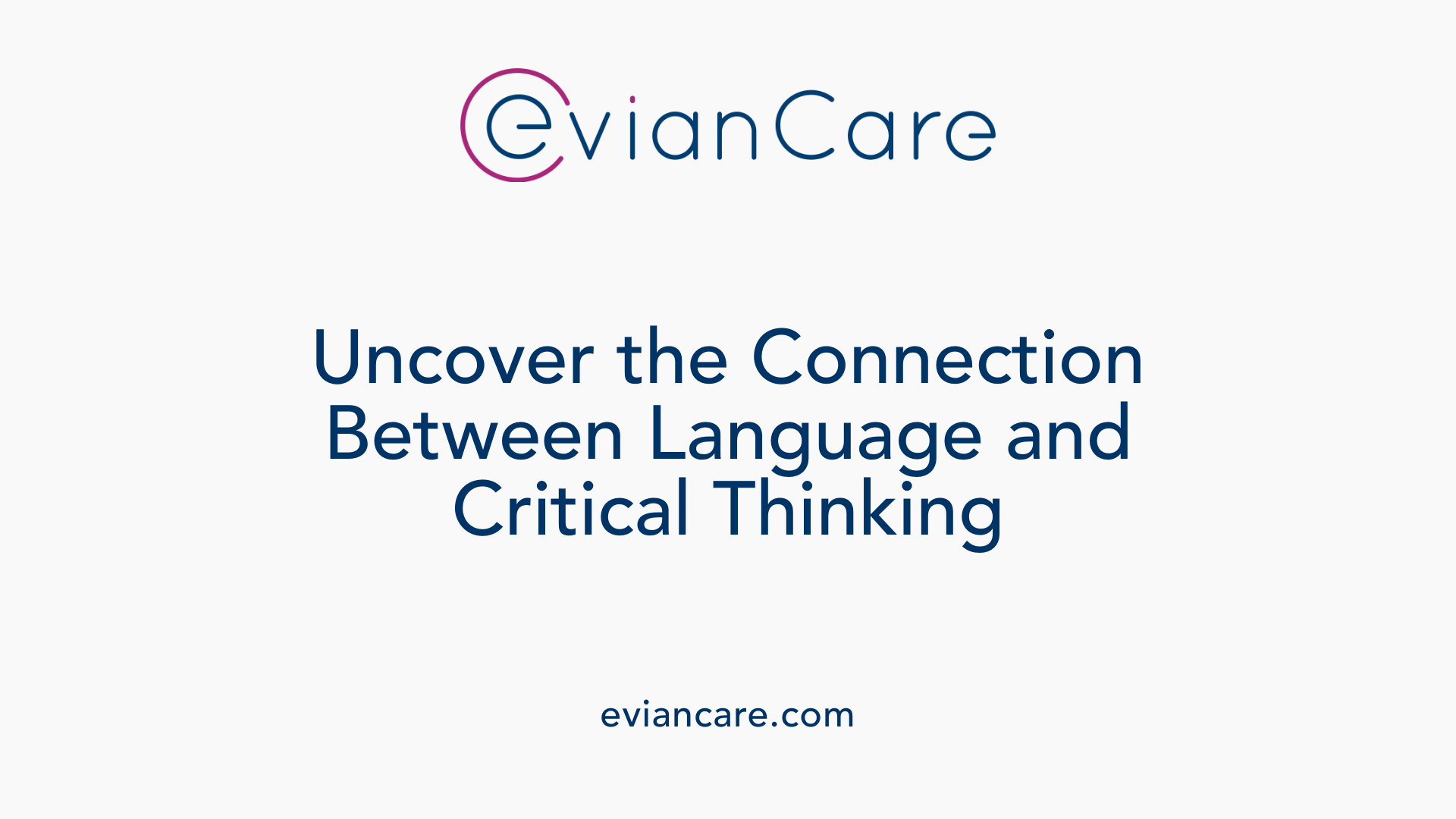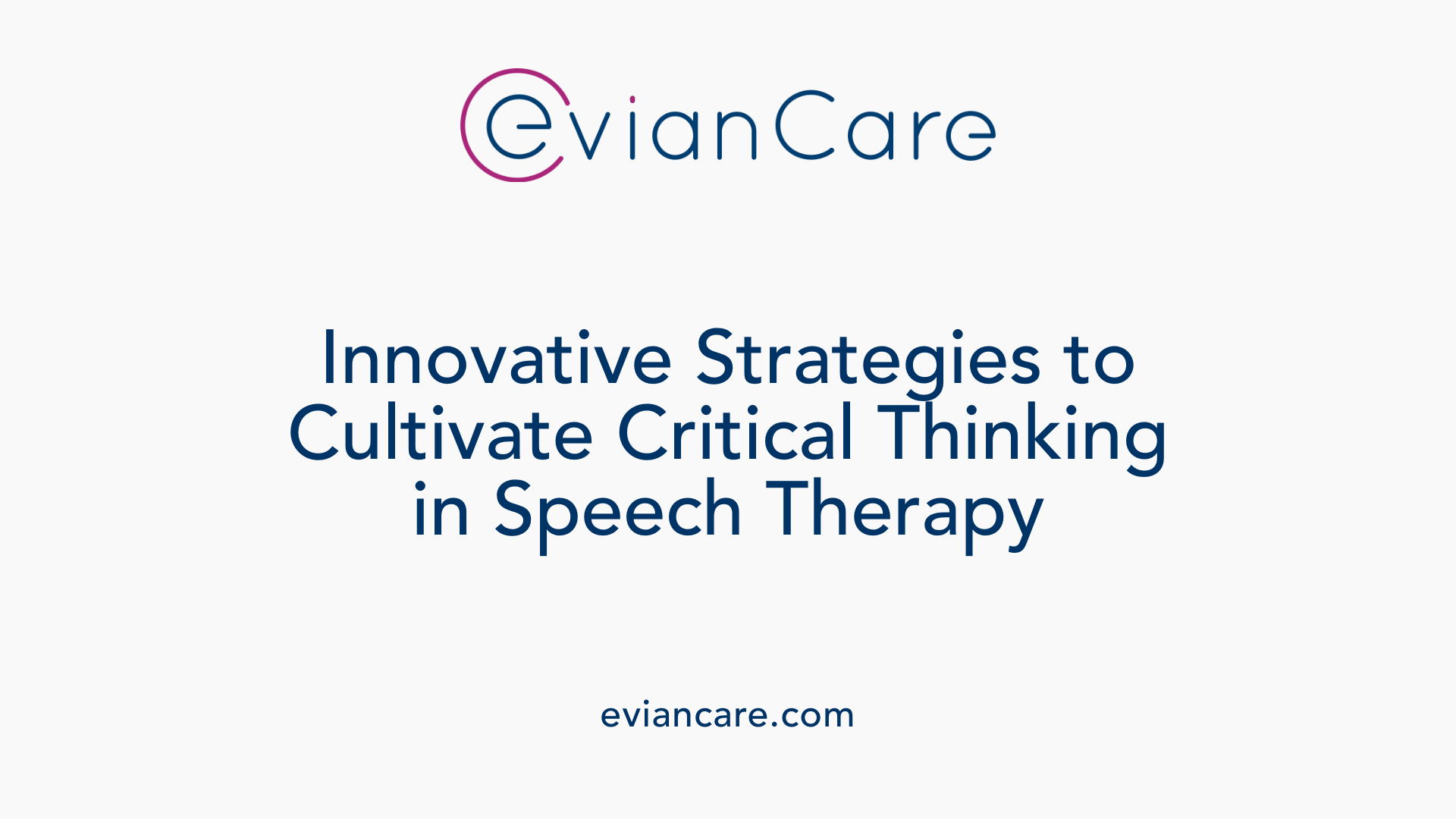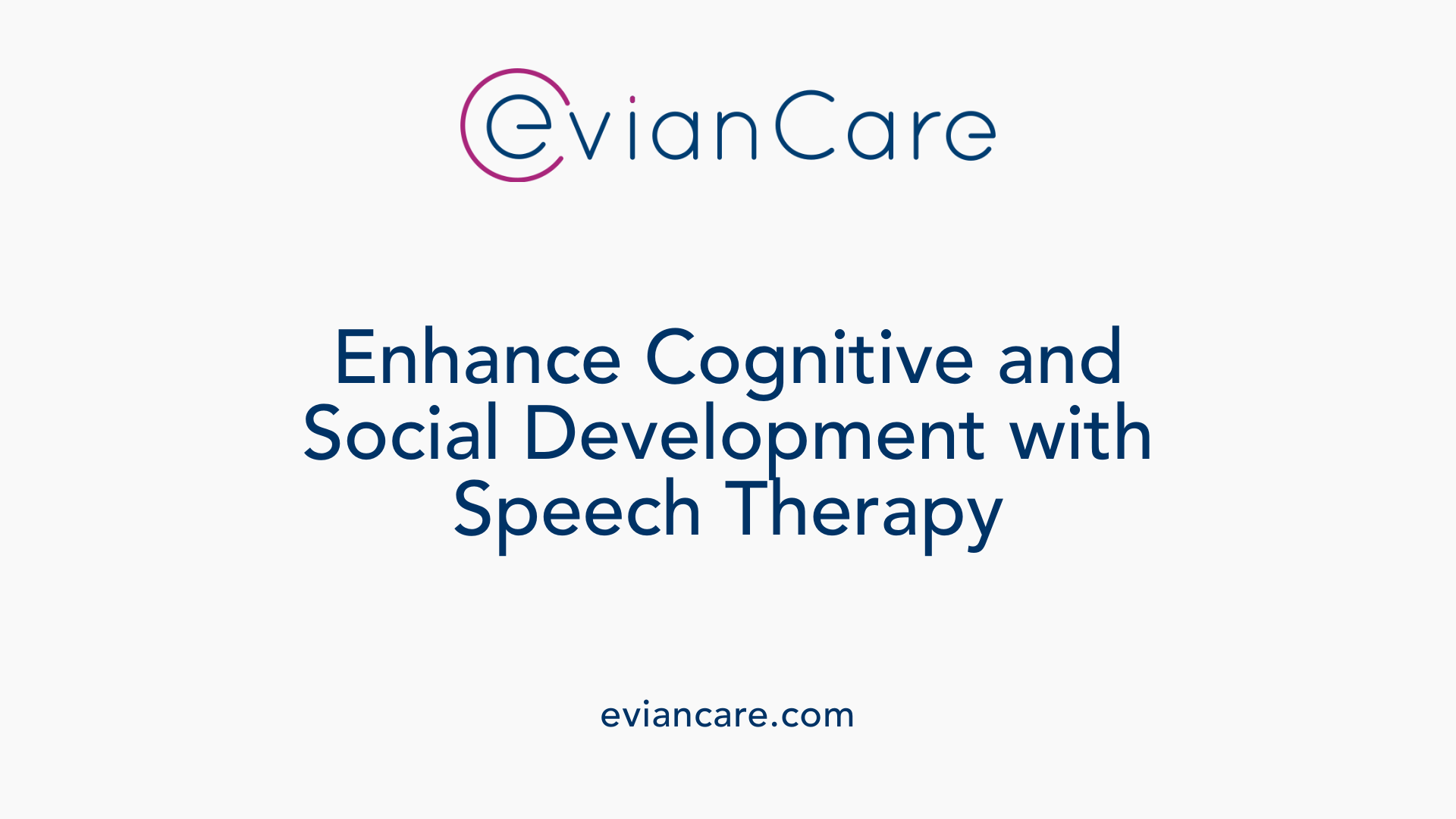
Building Minds Through Language
Speech therapy is widely recognized not only for its role in improving communication and language skills but also for its significant contribution to developing critical thinking abilities. By systematically targeting language comprehension, reasoning, and problem-solving, speech-language pathologists help individuals of all ages, especially children and students, to foster essential cognitive skills that underpin academic success and social competence. This article explores how speech therapy techniques can be effectively employed to enhance critical thinking through language development, supported by recent research and practical applications.
The Integral Link Between Language and Critical Thinking in Speech Therapy

Why is critical thinking important for clinical judgment and intervention planning?
Critical thinking is fundamental in speech-language pathology, especially when working with adults who have dysphagia. It enables clinicians to evaluate assessment results, interpret complex cases, and develop tailored intervention plans. By engaging in reflective reasoning, therapists can adapt strategies in real time, ensuring that interventions are effective and addressing each patient's unique needs.
In educational settings, fostering critical thinking in students prepares them for real-world clinical scenarios. It helps future speech therapists make informed decisions, collaborate with other professionals, and continuously improve their practice. The American Speech-Language-Hearing Association (ASHA) emphasizes that building such skills is essential for effective clinical judgment, ultimately enhancing patient outcomes.
How do language abilities influence reasoning, decision-making, and problem-solving?
Language skills are intricately linked to higher-order cognitive processes like reasoning and decision-making. For students and clinicians alike, robust language capacity allows for better articulation of ideas, understanding complex concepts, and engaging in analytical thinking.
Specifically, language proficiency facilitates the comprehension of case histories, medical terminologies, and the nuances of patient communication. As a result, it empowers clinicians to hypothesize accurately, evaluate intervention options critically, and solve complex problems, particularly in adult dysphagia management. For children, improved language ability leads to better social interactions and academic success, laying a foundation for strong reasoning skills.
How can speech therapy improve cognitive and academic skills?
Speech therapy offers various benefits beyond speech correction. It enhances cognitive functions, including memory, attention, and problem-solving, which are critical for learning.
Therapies involve activities like story analysis, debates, and creating presentations, fostering critical thinking and reasoning. For children and adolescents, these activities develop executive functions that support academic tasks such as reading comprehension, writing, and mathematical reasoning.
Furthermore, standardized assessments like the Test of Problem-Solving (TOPS) and the Clinical Evaluation of Language Fundamentals (CELF-5) measure progress in language and critical thinking, guiding therapy and educational strategies.
How does early intervention support long-term development?
Early speech and language intervention prevent the escalation of communication difficulties into more extensive academic and social issues later in life. It helps children build strong foundational skills, including language comprehension and expressive abilities.
By targeting cognitive skills like attention, memory, and reasoning early on, speech therapy facilitates better social-emotional development and academic achievement. Children who receive timely help tend to experience increased confidence, motivation, and better peer relationships, which are essential components of overall success.
What activities and collaborative approaches promote critical thinking?
Activities such as open-ended questions, story analysis, mock interviews, and
Techniques and Strategies to Foster Critical Thinking in Speech Therapy

What techniques and strategies are used in speech therapy to enhance critical thinking?
Speech therapy incorporates a variety of active, engaging methods designed to cultivate critical thinking skills. These include activities that emphasize reasoning, analysis, and problem-solving.
For example, language comprehension exercises challenge individuals to analyze and interpret information more deeply. Tasks like story analysis or discussing challenging texts stimulate critical evaluation and open-mindedness. Debates and role-playing activities promote reasoning within social contexts, encouraging students to develop argumentation and perspective-taking.
Problem-solving activities are also vital; they help individuals strategize and think critically about solutions in real-world scenarios. Tailored tasks, such as creating stories or discussing hypothetical situations, foster analytical thinking.
Moreover, social communication exercises build the ability to reason logically during interactions. These strategies are adapted to different ages and needs, ensuring that each learner develops essential critical thinking abilities alongside language skills.
How can speech therapy methods be applied to foster critical thinking through language?
Speech therapy methods harness language-based activities to boost analytical and evaluative skills. Using stories, picture books, and thematic tasks aligned with educational frameworks like Bloom’s Taxonomy, therapists engage children in predicting story outcomes, comparing characters, or crafting alternative endings.
Explicit instruction in skills such as argument analysis and bias recognition helps children evaluate information critically. Discussions and questioning techniques are fundamental; for example, asking children why certain characters acted a certain way or what might happen next encourages deeper reasoning.
Activities such as debates, story retelling, or connecting stories to real-life problems invite children to consider motives, weigh options, and synthesize information. These methods improve language skills and promote reasoning, which are essential for academic success and social understanding.
Overall, integrating critical thinking exercises into speech therapy creates a dynamic learning environment where language development and reasoning skills reinforce each other, preparing children for future educational and social challenges.
What research findings support the connection between speech therapy and critical thinking enhancement?
Research underscores the importance of structured, experiential learning approaches in speech therapy for fostering critical thinking.
Studies show that activities like viewing instructional videos, analyzing case studies, and engaging in peer discussions significantly develop students' analytical skills. Clinical settings offer unique opportunities to observe expert clinicians, receive feedback, and participate in supervision, which further enhances reasoning and judgment.
A multimodal educational approach—combining theoretical knowledge with practical application—has been proven effective. Although core assessments like TOPS and CELF-5 measure language and problem-solving, real-world activities such as debates, story analysis, and role-playing have been linked to improved critical thinking.
Overall, evidence suggests that integrating diverse methods and clinical exposure into speech therapy not only improves language skills but also enriches critical reasoning abilities. These strategies prepare students for complex decision-making in clinical settings and beyond, emphasizing the vital connection between speech-language pathology education and cognitive development.
Applying Speech Therapy to Broader Cognitive and Social Skills

How does speech therapy contribute to cognitive and academic development in children and adolescents?
Speech therapy plays a vital role in boosting children's overall learning and development. By working on speech clarity, phonological awareness, and understanding language, children gain skills essential for school performance.
Moreover, speech therapy enhances executive functions such as memory, attention, and organizational skills. These skills are crucial for managing classroom tasks, solving problems, and learning new concepts.
Social interaction is also improved through therapy. Better communication with peers and teachers leads to increased confidence and motivation in academic settings.
Early intervention is especially important. It prevents more serious language and emotional issues later on, helping children stay engaged and reducing frustration.
In summary, speech therapy not only targets speech and language but also supports cognitive growth and emotional resilience, laying a strong foundation for success in school and beyond.
| Aspect | Focus Area | How It Helps |
|---|---|---|
| Communication | Speech clarity, language comprehension | Enhances understanding and expression |
| Executive Skills | Memory, attention, organization | Supports learning and task management |
| Social Skills | Peer interaction, confidence | Encourages participation and emotional health |
| Emotional Well-being | Reduces frustration, anxiety | Fosters resilience and motivation |
How can speech therapy improve critical thinking skills through language development?
Developing language skills through speech therapy directly boosts critical thinking abilities. As children and adults learn to interpret information and express ideas clearly, they become better at analyzing and evaluating situations.
Speech-language pathologists often use real-life case studies, debates, and story analysis exercises. These activities promote reasoning, reflection, and the ability to consider multiple perspectives.
Building vocabulary and comprehension also enhances problem-solving skills. When individuals understand how to organize and evaluate information, they become more effective thinkers.
Furthermore, training in understanding cognitive biases and logical arguments helps future practitioners minimize errors in judgment, supporting a more analytical approach.
In essence, language development in speech therapy not only improves communication but also cultivates the critical thinking skills essential for decision-making and effective problem-solving in everyday life and clinical practice.
Empowering Minds Through LanguageMastery
In conclusion, speech therapy serves as a powerful tool for enhancing critical thinking through targeted language development. By integrating evidence-based techniques and engaging activities that promote reasoning, analysis, and problem-solving, therapists can significantly impact individuals’ cognitive and academic trajectories. Additionally, the development of social and emotional skills alongside cognitive abilities underscores the holistic benefits of speech therapy. As research continues to support the interconnectedness of language and critical thinking, it becomes clear that early, strategic intervention can prepare students and clients not only for academic success but also for lifelong problem-solving and reasoning. Embracing these approaches promises a future where communication fosters a more thoughtful, confident, and cognitively equipped generation.
References
- A study among fourth-year speech-language pathology ...
- Enhancing Cognitive Abilities in Kids Through Speech ...
- Language Skills and Critical Thinking in High School
- A study among fourth-year speech-language pathology ...
- Exploring perceptions of factors aiding the development of ...
- "Critical Thinking in CSD Undergraduates" by David M. ...
- A study among fourth-year speech-language pathology ...
- "Critical Thinking in CSD Undergraduates" by David M. ...
- Critical Thinking for Future Helping Professionals












